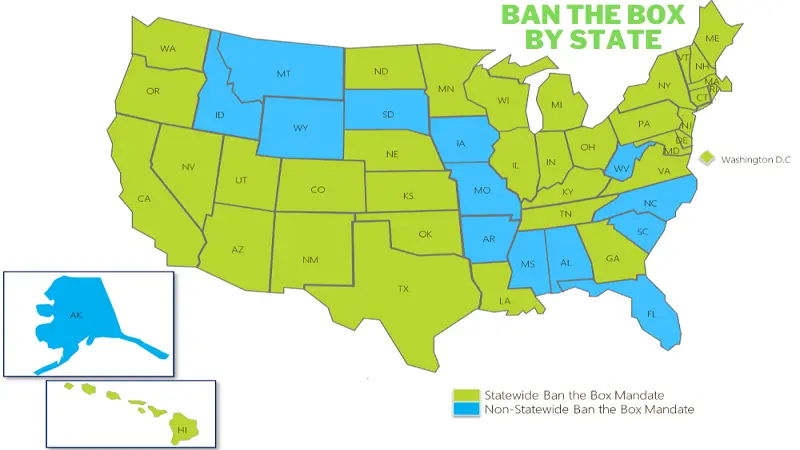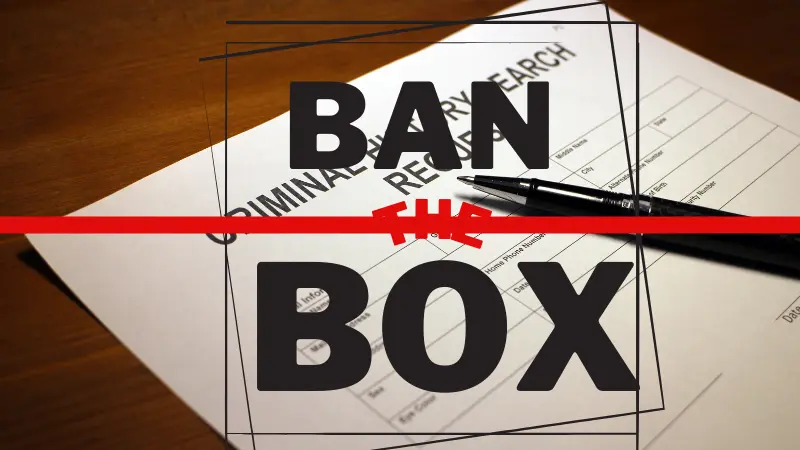Ban The Box laws have garnered significant attention and debate in recent years as a response to the challenges faced by individuals with criminal records during the job application process. The “box” refers to the checkbox on job applications that asks applicants about their criminal history. These laws aim to remove this inquiry from the initial stages of the hiring process, providing individuals with a fair chance to be considered for employment based on their qualifications and skills rather than their criminal background. Let’s go into Ban The Box laws by state.
Each state differs when it comes to this law. In recent years, many states and cities have put in place laws that prevent employers from asking about a job applicant’s criminal history until later in the hiring process. This is commonly known as “Ban the Box” legislation. Federal lawmakers are thinking about passing a law that would encourage states without these laws to put them in place as well.
What Is Ban The Box Law?
Ban the Box is not some new fad or some trick that is taking the nation by storm. No, it’s a movement aimed at making the hiring process fairer for individuals with criminal records. The “box” in question refers to the check box on job applications that asks applicants if they have a criminal history. Ban The Box laws seek to remove this question from applications, allowing job seekers to present themselves beyond their past mistakes.
The Ban The Box movement sprouted its roots in the early 2000s as a response to the difficulties faced by individuals with criminal records in securing employment. The idea was simple yet powerful – remove the barrier of that little box, and open up more opportunities for people seeking a fresh start. Since then, Ban The Box laws have gained momentum across the United States, with various states adopting their versions of this progressive movement.
Ban The Box Laws By State

Ban The Box laws have been making waves across the United States, with several states embracing this progressive approach to hiring. Some of the states that have implemented Ban The Box legislation include:
Arizona
( Implemented 2017. Applies to employment in the executive branch): Some state agencies are prohibited from asking about an applicant’s criminal record or arrest history until after the applicant has submitted a job application and been interviewed.
California
Assembly Bill (2017) Applies to private and public employers with 5+ employees: Employers must wait to run a background check or ask about criminal history until after extending a conditional offer.
Colorado
(2019) (Applies to private employment): Employers can’t ask about criminal records on job applications, but they can check publicly available records. State agencies and licensing agencies are prohibited from conducting background checks until the applicant is a finalist for the position or receives a conditional offer.
Connecticut
House bill (2016) (Public And Private Sector): Employers may not inquire about any expunged records at any time. Pardoned convictions cannot be the sole basis for discharge.
Delaware
House bill (2014) For public jobs: This bill applies to the state, its agencies, and political units, such as cities and counties. It prohibits public employers from background checks or credit scores of applicants until the interview is done.
Georgia
Executive order 2015. State employment: Criminal record checks are delayed until after the initial state job application. The order prohibits employers from automatically rejecting applicants with criminal records and gives applicants a chance to challenge the accuracy of their records.
Hawaii
Applies to public and private employment. Same prohibition as other states. However, employers can look into an employee’s felony record within the most recent ten years, excluding periods of incarceration. The employment may be withdrawn if the applicant’s crime holds a rational relationship to the duties of the position applied for.
Illinois
HOUSE BILL (2014) Applies to private employers with 15 plus employees and state employers. Just like in other states, employers are prohibited from rating applicants based on criminal history. The law is fully functional in Chicago and Cook County.
Indiana
Executive order (2017). For state employment in the executive branch. No question on the application requiring criminal history.
Kansas
Executive order (2018)
State employment in the executive branch
Kentucky
2017 State employment: No questions about convictions and criminal history.
Louisiana
House Bill 266 (2016) Applies to some state employment. State positions not classified and positions requiring background checks are exempt from the law.
Maine
LEGISLATIVE DOCUMENT 170 (2019) (State employment): The rules about who can work in certain government jobs are a bit different than other jobs. People with certain records might not be able to work in these government jobs. These special government jobs include working for cities or counties, working in schools, or certain state government jobs.
Maryland
SENATE BILL 839/HOUSE BILL 994 (2020) (APPLIES TO PRIVATE EMPLOYMENT): Employers with at least 15 full-time employees are not allowed to ask job applicants about their criminal records before an in-person interview. The law gives room for employers providing services to minors or vulnerable adults and does not prohibit them from making record-related inquiries as required or expressly authorized by federal or state law.
Massachusetts
SENATE BILL 2583 (2010) (APPLIES TO PUBLIC AND PRIVATE EMPLOYMENT): Effective May 4, 2012, Applicants must see their background check before being asked about criminal history or if it’s used to reject them.
Michigan
EXECUTIVE ORDER (2018) (APPLIES TO STATE EMPLOYMENT): Positions that are prohibited by federal or state law from hiring a candidate with a criminal history are exempted.
Minnesota
SENATE BILL 523 (2009, 2013) (APPLIES TO PUBLIC AND PRIVATE EMPLOYMENT):
Missouri
EXECUTIVE ORDER 16-04 (2016) (APPLIES TO PUBLIC EMPLOYMENT): The order excludes applications for positions for which people with convictions would be automatically disqualified.
Nebraska
LEGISLATIVE BILL 907 (2014) (APPLIES TO PUBLIC EMPLOYMENT): Prohibition is a normal Ban The Box.
Nevada
ASSEMBLY BILL 384 (2017) (APPLIES TO PUBLIC EMPLOYMENT): Employers can’t consider a candidate’s criminal history until the final in-person interview or a conditional job offer has been made.
New Hampshire
HOUSE BILL 253 (2020) (APPLIES TO STATE EMPLOYMENT): The law prohibits employers from asking about an applicant’s arrest or conviction history on job applications. Instead, they must wait until the interview to ask these questions.
New Jersey
ASSEMBLY HOUSE BILL 1999 AND SENATE BILL 1484 (2014) (APPLIES TO PUBLIC AND PRIVATE EMPLOYMENT): Prohibited until after the first interview and expunged record may not be considered.
Know how to clear and expunge your record.
New Mexico
SENATE BILL 254 (2010) (APPLIES TO PUBLIC EMPLOYMENT): Employers are not allowed to ask about criminal records on job applications until the applicant has been selected as a finalist for the position. The law bars the use of non-conviction arrest records and certain misdemeanor convictions for employment and licensing purposes.
SENATE BILL 96 (2019) (APPLIES TO PRIVATE EMPLOYMENT): prohibits inquiring into an applicant’s history of arrest or conviction on any written or electronic employment application.
New York
2015. State employment. Employers cannot inquire about or act against arrests/charges without conviction or pending. Denying employment/licensure based on conviction history is illegal unless it’s directly related to the job or poses a risk to property/safety. Agencies/employers must consider job-relatedness, timing, age, rehabilitation, and good conduct for applicants with records.
North Dakota
HOUSE BILL 1282 (2019) (APPLIES TO PUBLIC EMPLOYMENT): bars public employers from asking about or considering a job applicant’s criminal history until that applicant has been offered a conditional job offer.
Ohio
ADMINISTRATIVE POLICY HR-29 AND HOUSE BILL 56 (2015) (APPLIES TO PUBLIC EMPLOYMENT): The initial state employment application no longer asks about conviction and arrest history. Hiring managers are required to consider factors similar to those found in EEOC guidance.
The Ohio Fair Hiring Act prohibits using a felony conviction against certain public employees. Except if the conviction occurred while employed in the civil service.
Oklahoma
(2016) EXECUTIVE ORDER (APPLIES TO STATE EMPLOYMENT): Removal of questions regarding convictions and criminal history from job applications. It doesn’t apply to certain government jobs and positions where a felony would automatically disqualify an applicant.
Oregon
HOUSE BILL 3025 (2015) Applies to public and private employment.
Pennsylvania
ADMINISTRATIVE POLICY HR-TM001 (2017) (APPLIES TO STATE EMPLOYMENT): Existing Pennsylvania law (18 Pa. Cons. Stat.9125) The law prohibits employers from considering criminal history beyond job suitability. Applicants must be notified in writing if not hired due to their criminal record. Exceptions apply to security, law enforcement, and vulnerable populations.
Rhode Island
HOUSE BILL 5507 (2013) Applies to public and private employment.
Tennessee
SENATE BILL 2440 (2016) (APPLIES TO STATE EMPLOYMENT): Employers may consider an applicant’s criminal record in light of the job duties, the time elapsed since the offense, age of the applicant at the time of the offense, frequency, and seriousness of each offense, evidence of rehabilitation, and public policy considerations.
Utah
HOUSE BILL 156 (2017) (APPLIES TO PUBLIC EMPLOYMENT): Bars requiring an applicant to disclose conviction history before an interview or, before a conditional job offer.
Vermont
HOUSE BILL 261 (2016) Applies to private and public employment.
Virginia
HOUSE BILL 757 (2020) Applies to public employment.
EXECUTIVE ORDER 41 (2015) Employment in the state branch.
Washington
HOUSE BILL 1298 (2018) Applies to private and public employment.
Wisconsin
ASSEMBLY BILL 373 2016) (APPLIES TO STATE EMPLOYMENT): The law prohibits asking about a person’s criminal record on a job application and delays inquiries until the applicant has been certified for the position.
Most info about these states is gotten from Orange Tree. Also, visit NELP for more details on these laws.
While the Ban The Box movement aims for a fairer and more inclusive hiring process. The specific policies and requirements can vary from state to state. Some states may prohibit criminal record inquiries on job applications entirely. While others may allow employers to conduct background checks at a later stage in the hiring process. It’s important to be aware of the specific provisions in each area to fully understand the impact and reach of Ban The Box laws.
Advantages Of Ban The Box Laws
-
Reduction Of Employment Barriers For Individuals With Criminal Records
Ban the Box laws remove criminal history inquiries from job applications, promoting fair hiring practices for individuals with records. This helps employers focus on an applicant’s qualifications and abilities, increasing the possibility of employment and breaking the cycle of recidivism.
-
Effects On Recidivism Rates
One of the most exciting impacts of Ban The Box laws is the potential to reduce recidivism rates. When individuals with criminal records have more opportunities for gainful employment, they are less likely to return to a life of crime. By breaking down employment barriers, Ban The Box laws contribute to creating a safer and more prosperous society. It’s a win-win situation for both individuals looking for a second chance and for society as a whole.
-
Economic And Societal Implications
Ban The Box laws don’t just make a difference in the lives of individuals with criminal records; they also have broader economic and societal implications. When more people are employed, it leads to increased productivity and economic growth. Additionally, by providing fair employment opportunities, Ban The Box laws foster inclusivity and diversity in the workforce, leading to more innovative and dynamic workplaces.
Notable Provisions And Requirements Of Ban The Box Laws
-
Prohibition of criminal record inquiries on job applications
Ban The Box laws prohibit asking about an applicant’s criminal history on job applications, giving individuals a fair chance to demonstrate their potential.
-
Timing of criminal background checks in the hiring process
Ban The Box laws often regulate the timing of criminal background checks during the hiring process. While some states allow employers to conduct these checks later in the process, others may require them to wait until after a conditional offer of employment has been made. This delay ensures that an applicant is given a fair evaluation based on their qualifications before their criminal history is considered.
-
Exceptions and exemptions allowed under Ban The Box laws
Ban The Box laws may also include exceptions or exemptions for certain roles or industries where a criminal background check is deemed necessary. This recognizes that certain positions may require additional scrutiny due to safety concerns or regulatory requirements. However, these exceptions must be justified and should not be used as a blanket exclusion for individuals with criminal records in all job opportunities.
Controversies Surrounding Ban The Box Laws
-
Opposition from employers and business organizations
Ban The Box laws face opposition from employers and business organizations. They argue that these laws limit their ability to make informed hiring decisions and compromise workplace safety. However, it’s important to strike a balance between giving people a second chance and addressing employers’ concerns.
-
Concerns regarding liability and risk management
With Ban The Box laws, the fear of liability and risk management arises for employers. They worry about hiring individuals with criminal records who might pose a risk to their business or other employees. Employers need guidance and support to navigate these concerns while ensuring fair and non-discriminatory hiring practices.
-
Delays and difficulties in implementation and enforcement
Implementing and enforcing Ban The Box laws can be challenging for states and localities. Coordinating efforts across different agencies, clarifying guidelines, and educating employers can lead to delays and difficulties. Policymakers need to provide adequate resources and support to ensure smooth implementation and effective enforcement.
Summary

There is a growing trend among states to implement Ban The Box laws. As awareness of the importance of fair hiring practices increases, more states are likely to adopt similar legislation. These laws may adapt to employer concerns while protecting individuals with criminal records. Ban the Box laws could be expanded to the federal level. As more states adopt them, the national conversation about fair hiring practices grows. Future legislation could bring consistency to the hiring process for people with criminal records.
In conclusion, Ban The Box laws contribute to a more diverse and inclusive workforce. By focusing on qualifications, experience, and character instead of criminal history, employers can ensure a fair assessment of candidates’ abilities. This can lead to a workforce that better reflects the diversity of our society. Some employers recognize that individuals with criminal records have served their sentences and should not face lifelong barriers to employment.
Removing the checkbox about criminal history allows individuals to showcase their skills and qualifications without being immediately dismissed due to their past mistakes.

I’m Cli, also known as Castro. An author of felhus.com
I’ve got great passion for felons and wanna see them live absolutely normal again.
